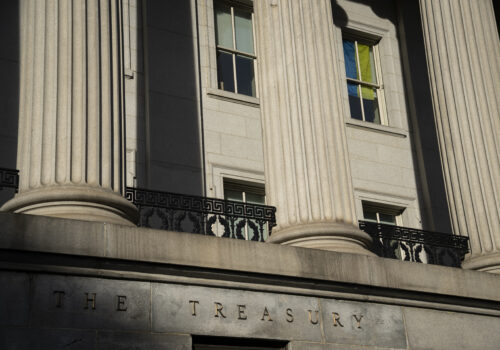Sanctions have become a tool of first resort. But enforcement needs upgraded and updated resources.
Enforcement remains a critical but underresourced element of economic sanctions. The US Congress and the Department of the Treasury should consider updates to its resources, public guidance, and policies to ensure the efficacy of sanctions enforcement as the use of the sanctions policy tool continues to expand.
Economic sanctions are often described as the foreign policy tool of first resort. The Department of the Treasury acknowledged this reality in its “2021 Sanctions Review.” Through its Office of Foreign Assets Control (OFAC), the Treasury Department administers thirty-eight different, albeit overlapping, economic sanctions programs. With only a few hundred employees, OFAC has a nearly unparalleled national security mandate with oversight of the US economy and many other facets of global economic activities. OFAC develops policies for the use of sanctions, designates sanctions targets like individuals, entities, and jurisdictions, engages with the private sector to promote compliance, and civilly enforces apparent violations by US persons and others. This latter enforcement role represents a critical but often overlooked capability. For instance, the same “2021 Sanctions Review” does not even mention the enforcement function in its assessment. (However, it did seek to ensure that sanctions are “enforceable” in the context of sanctions implementation.) Resource constraints, a lack of attention, and the prioritization of policy crises hamper this enforcement function. In 2023, OFAC only undertook seventeen public enforcement actions, including its largest settlement to date with Binance, a global cryptocurrency exchange. For perspective, the Department of Justice terminated 63,419 civil cases in fiscal year 2022, according to the most recent public data.
As the wider interagency continues to rely on sanctions as a critical tool and the United States seeks to expand partner sanctions capacity, US policymakers must fully support the sanctions enforcement function. Strengthening the internal controls for OFAC enforcement improves the rule of law through improved due process and protects OFAC from legal challenges that could existentially undermine its national security mission. OFAC enforcement urgently requires increased budgetary resources and an upskilled workforce from Congress, stronger internal procedures to avoid litigation risks, improved public guidance, and revised enforcement guidelines to promote consistency and improve compliance by industry.
Increasing necessary enforcement resources
As a first step, Congress should provide appropriate budgetary resources for OFAC and consider authorizing OFAC to create positions requiring legal and/or prosecutorial experience, and not just within the Treasury Department’s Office of the Chief Counsel, Foreign Assets Control, which is the legal office that supports OFAC.
Congress has taken necessary but incremental steps to increase the budget for the Treasury Department’s Office of Terrorism and Financial Intelligence (TFI), which includes OFAC. The resourcing of a sanctions economic analysis unit demonstrates a step in the right direction. Yet the outsized expectations from Congress and the interagency for OFAC (and other TFI components) do not correlate with its budget. For specific budgetary requests, Congress should authorize and appropriate for more OFAC enforcement officers, dedicated training and continuing education for enforcement officers, and more attorneys in the Office of the Chief Counsel, which reviews enforcement activities across the life cycle of an investigation. Sanctions can only remain an effective tool if new sanctions are paired with credible and timely enforcement actions. The yearslong lag between sanctions violations and enforcement actions would be reduced if OFAC enforcement had more personnel. Expanding the enforcement workforce would also provide sufficient staffing to allow the secondment of OFAC enforcement experts to more parts of the US government as well as the creation of overseas assignments with allies and partners to improve their sanctions enforcement competencies.
Relatedly, OFAC enforcement capabilities would be enhanced if Congress authorized attorney billets, or positions, in the OFAC enforcement function. OFAC and its sister office, the Financial Crimes Enforcement Network (FinCEN), which is the primary federal regulator for anti-money laundering and countering the financing of terrorism (AML/CFT), both have enforcement divisions that investigate apparent violations of sanctions and the Bank Secrecy Act regime, respectively. Unlike other enforcement capabilities at regulators with civil enforcement responsibilities like the Securities and Exchange Commission and Commodity Futures Trading Commission, OFAC and FinCEN enforcement officers are not required to have any legal training. On the contrary, Congress and the Office of Special Counsel in 2014 investigated FinCEN, in part, for hiring attorneys in nonattorneys roles, resulting in the suspension of FinCEN’s direct hiring authority for several years. Having attorneys in enforcement roles, rather than only as reviewers through the Office of the Chief Counsel, would raise the baseline skills and experience of the OFAC enforcement function in areas like investigative strategy, subpoena issuance, and witness interviewing. While the Treasury Department may have the unilateral authority to create these types of positions, as a practical matter, the legacy of the FinCEN hiring scandal disincentivizes senior Treasury leadership from expending time and political capital to initiate what would most likely be a major bureaucratic undertaking. Congress should do the work to get Treasury capabilities on a par with other civil regulatory agencies.
Improving internal procedures
Even without congressional action, OFAC has a number of options within its own control to improve internal procedures. These changes would increase consistency between different enforcement actions and even among different enforcement officers, which can vary wildly under existing practices. In making these changes, OFAC can both improve the quality and consistency of its enforcement practices while also improving the quality and attractiveness of its enforcement officer roles.
OFAC should articulate consistent standards for the use of subpoenas and tolling agreements. Increased enforcement brings with it increased litigation risk from enforcement targets, and any inconsistent practices by OFAC could leave it open to charges that it has acted arbitrarily and capriciously in violation of the Administrative Procedures Act. Nonetheless, based on the experiences of a number of practitioners, OFAC seems to use subpoenas haphazardly and in unpredictable ways. Similarly, OFAC’s use of tolling agreements—which suspend the statute of limitations during an investigation—including their duration and when OFAC insists on them seem to vary from case to case. Nonetheless, OFAC enforcement officers often claim they are only using “boilerplate” terms. This can often leave parties confused about whether they are the target of an enforcement investigation or merely providing evidence for another party, and therefore whether there is genuine benefit to entering into a tolling agreement. To provide greater consistency and to give enforcement officers better guidance, OFAC should:
- articulate a standard for issuing subpoenas and explain that standard to recipients
- standardize the timing of subpoena responses and a subsequent reply from OFAC
- create greater consistency on requests for tolling agreements, including a presumptive length of time for such agreements across different cases
OFAC enforcement should engage with the Office of the Chief Counsel earlier and more often in the course of investigations and enforcement actions. Often and in part due to resource constraints, counsel only becomes involved in an investigation late in the process, meaning they are not reviewing subpoenas, tolling agreements, or other practices for legal sufficiency or overall consistency. The involvement of counsel’s office earlier in the process could meaningfully improve and standardize enforcement practices, minimizing litigation risk and imposing consistency across enforcement actions.
Increasing public guidance and transparency
OFAC enforcement, working with its policy and compliance components, can improve guidance and transparency in its operations by increasing publicly available resources on its enforcement practices. OFAC should be commended for its compliance efforts, such as publishing “A Framework for OFAC Compliance Commitments” in 2019 and a 2021 companion for the virtual currency industry. These are necessary but not sufficient, and compliance documents could be enhanced with more enforcement-focused guidance. Some of these recommendations could be implemented with the current workforce, but more time-intensive initiatives would require additional personnel, as recommended above.
Within its existing legal authorities, OFAC could take several steps that would have immediate effects in improving its operations and engaging with an increasing segment of the economy that seeks to comply with OFAC sanctions. At a policy level, OFAC could articulate where enforcement has worked or failed to achieve policy goals with specific examples. As a starting point, OFAC could publish guidelines to explain the circumstances under which OFAC declines to pursue an enforcement action through so-called cautionary or no action letters. This guidance would send a powerful signal to the public, while also highlighting the ongoing work of OFAC enforcement for its exercise of discretion. Complementing this guidance, OFAC could consider publishing anonymized cautionary or no action letters, with explanations or redacted voluntary disclosures, to provide greater clarity into OFAC’s standards and practices. The other benefit would be additional data for industry stakeholders to understand the bounds of permissible as well as impermissible conduct.
The OFAC enforcement division also could publish a more detailed statement of facts with each public enforcement action and/or settlement agreement case to similarly educate the public and inform sanctions compliance programs. Similarly, the office could consider publishing all settlement agreements.
These various efforts would yield many benefits to improve OFAC’s internal operations, engagement with the public for compliance, and due process for investigation targets.
Amendments to OFAC enforcement regulations
Perhaps the lowest hanging fruit is for OFAC to revise its enforcement guidelines to provide greater clarity and transparency in how OFAC calculates penalties. OFAC’s enforcement guidelines, which appear at 31 C.F.R. § 501 Appendix A, provide the most granular framework available regarding OFAC’s calculation of a potential penalty, including the calculation of a base penalty and aggravating and mitigating factors to raise and lower the base penalty. While OFAC may have been reluctant in the past to provide more detailed guidance, concerned that it could limit its discretion to decide a penalty, OFAC would maintain broad discretion even after making extensive amendments to these regulations. The enforcement guidelines provide reasons for increasing or lowering a penalty, but do not restrain OFAC in any way with respect to the weight it gives to various mitigating and aggravating factors, meaning providing greater detail about those factors would not hamstring OFAC in the way it chooses to use them.
Below are three priority technical fixes for OFAC to provide greater specificity in its enforcement regulations:
First, OFAC should provide more specific guidance on the definition of the transaction value that it uses to establish the base penalty in a given enforcement action. Currently, the regulations define the transaction value as “the domestic value in the United States of the goods, technology, or services sought to be exported from or imported into the United States.” [See 31 C.F.R. § 501(I)(H).] Yet as it continues, the regulation makes clear how arbitrary that definition may be, defining the value of an export of goods to be the market value of those goods and a dealing in blocked property to be the value of the blocked property. The regulations, therefore, establish the same transaction value for a person who transfers blocked funds to a sanctioned person as for the bank that inadvertently processes the transaction, or for an individual who sends equipment to a sanctioned person as for a company that provides shipping or insurance services. Relatedly, OFAC should clarify how the “transaction value” applies to facilitation cases, and whether OFAC would use the value of the transaction facilitated or merely the value of the services provided by the enforcement target.
Second, OFAC, in the course of determining the base penalty, could also consider a universal standard to value the course of the apparent violative conduct. Currently, OFAC’s regulations calculate the base penalty based on the sum of each transaction or the statutory maximum of each transaction, in some cases whichever is greater. Accordingly, the maximum penalty in egregious cases—for which OFAC uses the statutory maximum “per transaction” to calculate the base penalty—could vary dramatically if the goods or services were provided in a single transaction or split among many transactions. In the latter case, the statutory maximum would be multiplied by each transaction, potentially making it exponentially larger than the penalty for a single transaction involving the same amount of goods or money. For example, OFAC calculated the base penalty in the 2023 Binance case to be an eye-popping $592,133,829,398 (which was settled for less). OFAC could establish a universal method for considering the entire course of conduct, avoiding these wildly differing outcomes, but also considering more important factors such as the harm to the sanctions program and impact on the US financial system.
Third, just as many other enforcement agencies already do, OFAC could provide a consistent standard for crediting penalties paid to other US agencies or even foreign jurisdictions. As OFAC’s enforcement more regularly becomes part of a cross-agency enforcement effort, enforcement targets are often paying penalties to OFAC, the Department of Justice, New York’s Department of Financial Services, and other agencies for the same conduct. OFAC does take into account and credit all or part of these penalties to avoid duplicate civil enforcement for the same violations, but it has not publicized any standard for the circumstances in which it will do so. Similarly, as enforcement ramps up in the United Kingdom and within the European Union, OFAC could consider credit for penalties imposed by foreign authorities and articulate a standard for this type of credit.
Conclusion
As policymakers continue to rely on economic sanctions as a tool of first resort, sanctions enforcement must remain a central part of the policy process to maintain the tool’s efficacy. This starts with a more credible, resourced, and transparent enforcement capability. Increasing the budget, upskilling personnel, harmonizing internal protocols, expanding publicly available guidance, and revising regulations for sanctions enforcement will make meaningful improvements to the use of economic sanctions and provide a model for allies and partners to develop the full spectrum of sanctions capabilities.
About the authors
David Mortlock is a nonresident senior fellow at the Atlantic Council Global Energy Center. He is chair of the Global Trade & Investment Group at the law firm Willkie Farr & Gallagher, where he focuses on sanctions, export controls, and other international trade issues, and managing partner of Willkie’s Washington office.
Alex Zerden is an adjunct senior fellow at the Center for a New American Security. He is the founder of Capitol Peak Strategies, a risk advisory firm focusing on economic sanctions, financial regulation, and illicit finance issues.
Acknowledgment and disclaimer
This article was informed by not-for-attribution roundtable discussions with economic sanctions and other subject matter experts. The authors would like to thank those who participated, including those listed below, though we recognize they do not necessarily share all the views expressed herein: Justyna Gudzowska, John Hughes, Michael Mosier, Britt Mosman, Maura Rezendes, and Adam Smith.
Related content
Image: The Albert Gallatin statue is pictured in front of the northern entrance to the United States Treasury Building, Washington DC. | iStock via Flory


